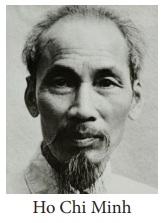World between Two World Wars | History - Anti-Colonial Movements and Decolonisation Processes in Asia | 10th Social Science : History : Chapter 2 : The World between Two World Wars
Chapter: 10th Social Science : History : Chapter 2 : The World between Two World Wars
Anti-Colonial Movements and Decolonisation Processes in Asia
Anti-Colonial Movements and Decolonisation Processes in Asia
(a) French Indo-China
Rise of Anti-Colonialism
Indo-China
(today’s Cambodia, Laos and Vietnam) had shown its discontent right from the
beginning of the French occupation (1887). While the Indo-Chinese resisted the
imposition of French language and culture, they learned from them the ideas of
revolution. During the First World War about 100,000 Indo-Chinese fought in
France and returned with first-hand knowledge of how the French had fought and
suffered during the War. Communist ideas from mainland China were also a major
influence. Many became convinced that the considerable wealth of Indo-China was
benefiting only the colonial power.
Decolonisation is a process through which colonial powers
transferred institutional and legal control over their colonies to the
indigenous nationalist governments.
The Emergence of Viet Minh
The mainstream
political party in Indo-China was the Vietnam Nationalist Party. Formed in
1927, it was composed of the wealthy and middle class sections of the population.
In 1929 the Vietnamese soldiers mutinied, and there was a failed attempt to
assassinate the French Governor-General. This was followed by a large scale
peasant revolt led by the Communists. The revolt was crushed followed by what
is called “White Terror.” Thousands of rebels were killed.

Ho Chi Minh (1890-1969) was born in Tongking. When Ho Chi Minh
was twenty one, he went to Europe. After working as a cook in a London hotel,
he went to Paris. In the Paris peace conference, he lobbied for the
independence for Vietnam. His articles in newspapers and especially the
pamphlet, French Colonialism on Trial,
made him well known as a Vietnam nationalist. In 1921 he became a founder-member of the French Communist
party. Two years later he went to Moscow and learnt revolutionary techniques
then. In 1925, he founded the Revolutionary Youth Movement.
After the
White Terror, Ho Chi Minh left for Moscow and spent the 1930s in Moscow and
China. When France was defeated by Germany in 1940, Ho Chi Minh and his
lieutenants used this turn of events to advance the Vietnamese cause. Crossing
over the border into Vietnam in January 1941, they organized the League for the
Independence of Vietnam, or Viet Minh. This gave renewed emphasis to a distinct
Vietnamese nationalism.
(b) Decolonisation in India
Dyarchy in Provinces
The
decolonization process started in India from the beginning of the twentieth
century with the launch of the Swadeshi Movement in 1905. The outbreak of the
First World War brought about rapid political as well as economic changes. In
1919, the Government of India Act introduced Dyarchy that provided for elected
provincial assemblies as well as for Indian ministers to hold certain
portfolios under Transferred Subjects. The Indian National Congress rejected
Dyarchy and decided to boycott the legislature.
Lack of Measures to Industrialise India
Despite
the discriminating protection given to certain select industries such as sugar,
cement, and chemicals, there was no change in the colonial economic policy. But
in the case of indigenous industries, support was only in the form of providing
“technical advice and education, and the establishment of pioneer factories in
new industries”. However, even this policy was soon abandoned as many British
enterprises were opposed to this .
Impact of Depression on Indian Agriculture
The
‘Great Depression’ also dealt a death blow to Indian agriculture and the
indigenous manufacturing sector. The value of farm produce, declined by half
while the land rent to be paid by the peasant remained unchanged. In terms of
prices of agricultural commodities, the obligation of the farmers to the state
doubled. The great fall in prices prompted Indian nationalists to demand
protection for the internal economy. The 1930s saw the emergence of the Indian
National Congress as a militant mass movement.
Government of India Act, 1935
The
British had to appease the Indian nationalists and the outcome was the passage
of the Government of India Act, 1935. This provided for greater power to the
local governments and the introduction of direct elections. In the 1937
elections the Congress won a resounding victory in most of the provinces.
However the decision of Britain to involve India in the Second World War,
without consulting the popular Congress ministries, forced the latter to resign
from office.
Related Topics